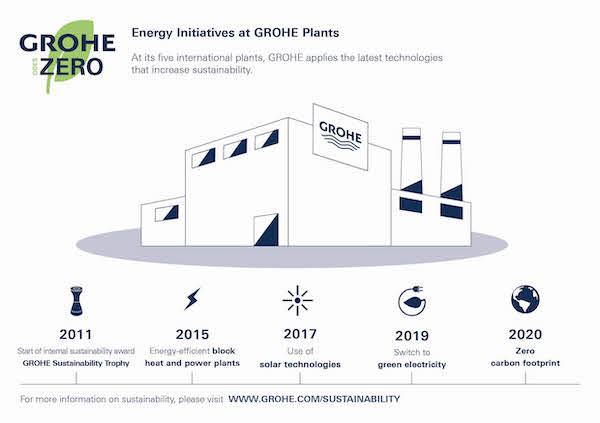GROHE has been able to increase its energy efficiency by 24% and reduce greenhouse gas emissions by 40%, far exceeding its sustainability targets In July 2019, the global brand converted all of its production plants to run on green electricity In the future, GROHE will offset unavoidable CO2 emissions with compensation projects Piscataway, N.J. — Read more
GROHE Aims for Carbon-Neutral Production by 2020
- GROHE has been able to increase its energy efficiency by 24% and reduce greenhouse gas emissions by 40%, far exceeding its sustainability targets
- In July 2019, the global brand converted all of its production plants to run on green electricity
- In the future, GROHE will offset unavoidable CO2 emissions with compensation projects
Piscataway, N.J. — Sustainability has been an essential element of GROHE’s corporate strategy for almost 20 years now. As early as 2000, the global brand for complete bathroom solutions and kitchen fittings committed itself in its “principles and guidelines for sustainability” to continuously improving all products, processes and services in terms of protecting the environment and conserving resources. Since then, GROHE has set new industry standards, applying its 360-degree sustainability approach that incorporates employees, suppliers, customers, processes, products and the company’s social contribution alike. With the aim of becoming the first leading manufacturer of the sanitary industry to achieve carbon-neutral production by 2020, GROHE has once again stepped up its pledge. In July, as part of the “GROHE goes ZERO” initiative, all five production plants worldwide as well as the logistics centers in Germany were converted to run on green electricity. With the start of the new fiscal year in April 2020, the sanitary manufacturer will offset unavoidable CO2 emissions through two compensation projects.

“More than ever, manufacturers like GROHE are in demand to take on responsibility and strive towards more sustainability,” says Thomas Fuhr, CEO Grohe AG. “For years now, we have been investing not only in research and development in order to produce intelligent, sustainable solutions, but also to a large degree in a resource-saving value chain. With GROHE goes ZERO, we are now setting an example for the entire industry: We are actively addressing the CO2 challenge by increasingly avoiding emissions and, if this is not possible, compensating for them.”
The sustainability initiative is seamlessly linked to numerous measures that are taking place at the GROHE plants, promoting the long-term reduction of the carbon footprint and conserving resources: The brand has invested in block heat and power plants, was awarded the silver certificate by the German Sustainable Building Council for the plant extension in Klaeng, Thailand, and built a state-of-the-art test laboratory in Hemer, Germany. GROHE also uses advanced technologies that increase sustainability, such as the material-saving 3D metal-printing process which has been launched this year.
As a result, GROHE has been able to increase its energy efficiency by 24% and reduce its greenhouse gas emissions by around 40% since the introduction of its sustainability program in 2014. This means that the global brand has already far exceeded its 2021 targets of 20% respectively.
GROHE Supports Two Water Projects in India and Malawi
Supporting two offsetting projects is another logical step for GROHE to compensate for so far unavoidable CO2 emissions: In the north of India, the operation of a hydroelectric power plant replaces electricity that mainly comes from coal-fired power plants. In the African non-coastal state of Malawi, a project repairs and maintains boreholes that are used to produce drinking water. With the help of selected offset projects, GROHE will support activities based on extremely stringent criteria, such as the Gold Standard, developed under the aegis of the WWF. In addition to avoiding CO2, the measures also contribute to a more sustainable, ecological and social development within the projects’ environments.
“With GROHE goes ZERO, we are further expanding our leading position as one of the most sustainable brands in the sanitary industry,” says Thomas Fuhr. “But at the same time, we have by no means reached all of our sustainability goals; we can and must get even better.”
GROHE has received numerous awards for its commitment. Currently, the brand is one of three major companies that have been nominated for the German Sustainability Award. GROHE CEO Thomas Fuhr was recently awarded for his commitment to sustainability by the corporate network B.A.U.M., the German Environmental Management Association.
GROHE’s parent company, LIXIL, is committed to improving the quality of people’s lives by delivering safe and comfortable products and services through responsible, sustainable innovations. LIXIL focuses on three strategic sustainability pillars: Global Sanitation & Hygiene, Water Conservation & Environmental Sustainability, and Diversity & Inclusion. In addition to providing solutions to enable access to safe and hygienic sanitation practices, LIXIL’s efforts also aim to conserve water, energy and other natural resources utilized in its products and services, from procurement through production, distribution, end use and product disposal.
